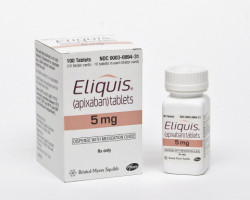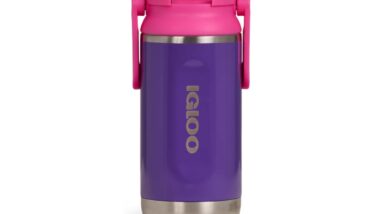Top Class Actions’s website and social media posts use affiliate links. If you make a purchase using such links, we may receive a commission, but it will not result in any additional charges to you. Please review our Affiliate Link Disclosure for more information.

Anticoagulants or blood thinners are drugs that reduce the risk of stroke, pulmonary embolisms, some types of heart attack and other conditions. What all of these maladies have in common is that they are caused by an errant blood clot blocking the blood supply to critical organs and tissues. While blood clotting is a normal part of the healing process and critical to human survival, many people have risk factors that make them more likely to form blood clots within their blood vessels that can cause serious injury.
Blood thinners like Eliquis (also known as apixaban) are designed to make it harder for blood to clot, reducing the risk of serious medical crisis. Like all blood thinners, Eliquis side effects present some potential health risks to its users; however, Eliquis and other newer-generation blood thinners may have special risks that present life-threatening complications to patients. As a result, many patients or patients’ families are now pursuing Eliquis lawsuits against the drug’s manufacturer.
Eliquis and Other New Generation Anticoagulant Complications
Allegedly, newer-generation blood thinners like Eliquis have several advantages over older blood thinners like Warfarin.
Warfarin and related agents worked by interfering with Vitamin K, which the human body needs to form blood clots. This required patients taking Warfarin to be on a carefully regulated diet to avoid excess vitamin K, which could block the drug’s function. Additionally, patients taking Warfarin were required to undergo regular blood testing to make sure they were absorbing enough of the drug to be effective, but not absorbing so much that they cannot clot at all. If a patient completely loses the ability to form blood clots, they risk uncontrollable bleeding incidents like gastrointestinal bleeding, pulmonary bleeding, and intracranial bleeding. In these conditions, a blood thinner works too well and patients risk bleeding to death from relatively minor injuries.
As Warfarin and related blood thinners’ patents expired, drug makers began to develop and release a new generation of blood thinners, including Eliquis. At present, there are three major new-generation blood thinners competing for the blood thinner market. Bristol-Myers Squibb and Pfizer jointly own Eliquis, which is projected to make $3 billion in sales during the 2015 year. Eliquis is in direct competition with fellow next-generation blood thinners Pradaxa and Xarelto. However, there are concerns that newer-generation blood thinners like Eliquis may carry special risks of their own, according to recent Eliquis lawsuits.
While all blood thinners carry the risk of various types of uncontrollable bleeding, older anticoagulants like Warfarin had a built-in contingency. If a patient experiences uncontrollable bleeding, doctors could give patients taking older blood thinners like Warfarin or Coumadin a very high dose of Vitamin K. This would effectively stop the drug. However, there is no known reversal agent for newer generation blood thinners.
Additionally, some Eliquis research has suggested that patients taking newer-generation blood thinners may not absorb the drug uniformly. Though newer generation blood thinners like Eliquis are heavily advertised as not requiring blood testing like Warfarin, there is growing evidence that many patients taking newer-generation blood thinners may require the same type of testing that Warfarin patients traditionally need. Research suggests that many patients taking Xarelto—a similar drug to Eliquis—may be absorbing too much or too little of the drug, risking either uncontrollable bleeding or blood clots depending on the individual. Additionally, the types of blood testing used in the study is not widely available, making it hard to deploy.
Eliquis Lawsuits
Eliquis lawsuits have been filed by Eliquis patients who have suffered from uncontrollable bleeding while using Eliquis. These Eliquis lawsuits allege that drug makers were aware of the risk of uncontrollable bleeding with Eliquis but continued to market Eliquis anyway, endangering the public for profit. Eliquis lawsuits typically seek to recoup costs related to alleged Eliquis side effects, like uncontrollable bleeding, as well as legal fees, lost wages, and other costs allegedly stemming from fraud and negligence in the safety testing and marketing of Eliquis.
Do YOU have a legal claim? Fill out the form on this page now for a free, immediate, and confidential case evaluation. The Eliquis attorneys who work with Top Class Actions will contact you if you qualify to let you know if an individual lawsuit or Eliquis class action lawsuit is best for you. [In general, Eliquis lawsuits are filed individually by each plaintiff and are not class actions.] Hurry — statutes of limitations may apply.
Get Help – It’s Free
Join a Free Eliquis Class Action Lawsuit Investigation
If you or a loved one took Eliquis (apixaban) and suffered injuries such as uncontrollable internal bleeding, gastrointestinal bleeding, hemorrhaging, kidney bleeding or death, you may have a legal claim. See if you qualify by filling out the short form below.
An attorney will contact you if you qualify to discuss the details of your potential case at no charge to you.
Oops! We could not locate your form.
ATTORNEY ADVERTISING
Top Class Actions is a Proud Member of the American Bar Association
LEGAL INFORMATION IS NOT LEGAL ADVICE
Top Class Actions Legal Statement
©2008 – 2024 Top Class Actions® LLC
Various Trademarks held by their respective owners
This website is not intended for viewing or usage by European Union citizens.












